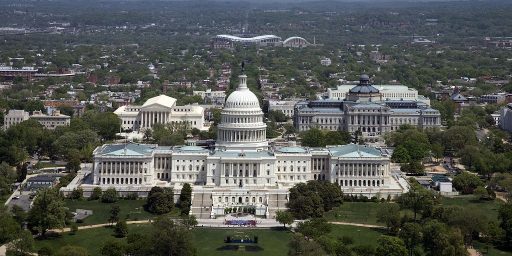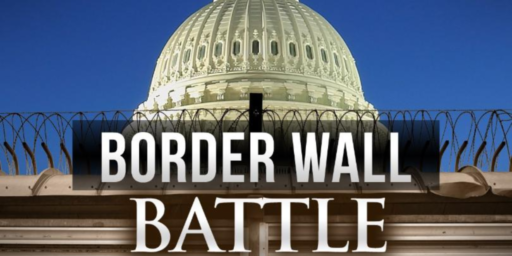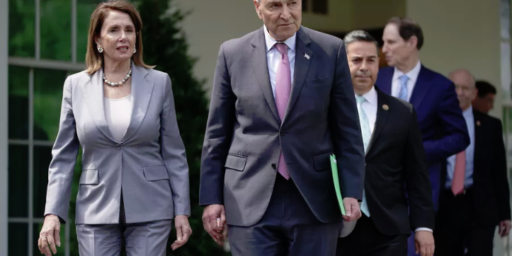House Freedom Caucus Backs Health Care Reform Bill That Republicans Haven’t Revealed Yet
The House Freedom Caucus is apparently getting behind a revised version of the GOP's plan to 'repeal and replace' the Affordable Care Act, but the GOP hasn't revealed what the new plan entails.
The House Freedom Caucus has agreed to back an as-yet unrevealed revision of the Republican plan to repeal and replace the Affordable Care Act, but the viability of the measure in Congress remains up in the air:
The House Freedom Caucus members, acutely aware that the White House and Republican colleagues blamed them for the failure of an earlier bill to get off the ground in the House, are eager to shift the blame to more moderate members who may now reject the measure.
“Over the past couple of months, House conservatives have worked tirelessly to improve the American Health Care Act to make it better for the American people,” Alyssa Farah, a spokeswoman for the House Freedom Caucus, said in a prepared statement. Because of those changes, she added, “the House Freedom Caucus has taken an official position in support of the current proposal.”
The group agrees to take an official position when 80 percent of their roughly three dozen members agree.
(…)
Speaker Paul D. Ryan said Wednesday that a new bill could come to the floor at some point if sufficient support surfaced. “We’ll vote on it when we get the votes,” he said.
There is also a provision in Mr. MacArthur’s effort that the amendment does not apply to members of Congress and their staff. This is intended to help it get past complex rules in the Senate, but has already become fodder of Democrats attacks.
Under another waiver included in the new measure, insurers could charge higher premiums to sick people who want to buy insurance after experiencing a gap in coverage of 63 days or more. This would undo a core provision of the existing law, which generally prohibits insurers from considering a person’s health status or medical history in setting premiums.
To qualify for this type of waiver, a state would have to operate some kind of program to help “high-risk individuals” obtain coverage, or a program to help stabilize premiums or to help pay high-cost claims.
Given the fact that Congress is currently focused on getting a spending plan passed before midnight on Friday, the odds that there will be any kind of vote on health care reform before the President’s first 100 days expire on Saturday is extremely unlikely. Instead, we’ll likely not see a vote until the Republican leaders in the House can be reasonably assured that they’ll be able to get the votes they need to get a majority on the first vote rather than experiencing the embarrassing defeat that they suffered at the end of March when support for what was then called the American Health Care Act collapsed as both moderates and conservatives in the House GOP caucus withdrew their support for the final product. In this case, the changes that have been made to appease the conservatives in the House Freedom Caucus may end up being too much for the GOP moderates represented by the Tuesday Morning Group and other informal groups of Republicans. If that happens, then Ryan, GOP Majority Leader Kevin McCarthy, and their leadership team will be faced with the choice of either revising the bill again to address the concern of moderates, in which case they risk losing the support of the conservatives in the Freedom Caucus, or the put the entire issue on the back burner while Congress concentrates on issues such as an impending deadline regarding raising the debt ceiling and the tax plan that the Trump Administration announced today and which it will at some point be submitting to Congress when the details are finalized or admitting another major defeat when it comes to health care reform. If they end up with another failure, then it could be the case that health care reform will be dead for this year and the PPACA will remain in full force and effect.
Even if a measure manages to pass the House, of course, that’s not the end of the matter. Since we haven’t seen the details of the new plan, it’s not clear if the revised bill would qualify to be considered under the Senate’s budget reconciliation rules, in which case it would not be subject to the cloture rule’s sixty vote threshold, or whether it will have to be treated as normal legislation. Additionally, even if the bill does qualify for reconciliation, Democrats will likely seek to slow down its progress as much as possible using other Senate rules and procedures, including offering amendments that the Senate will be required to consider before it can proceed to a final vote. Additionally, Republicans who represent states that have chosen to accept the PPACA’s Medicaid expansion will likely be very interested in what the House bill has to say about that issue, and several of those Senators from states such as Ohio and elsewhere have signaled that they might not support a bill that would end up hurting their state financially. As a result, there’s a possibility that what emerges from the Senate will be different from what passed the House. In that case, the ordinary procedure would be for the two bodies to appoint members to a Conference Committee that attempts to hammer out a bill that can pass both chambers. That bill, if it can be crafted, would then have to be approved by both the House and the Senate in subsequent votes before being sent to the White House. In other words, we’re far from the end of the process at this point.
In other words, we’re far from the end of the process at this point, and given that we haven’t even see a revised bill yet, and the Congressional Budget Office has yet to score any such proposed bill, it’s hard to make any real guess about what’s likely to happen. Taking Congress’s record so far on this issue, though, I wouldn’t bet on them succeeding in the near term.






Even thoough I’m marginally effected by the bill, my kids will be down the road. I’ve already called my congressman, for all the good it will do.
I was surprised I got a live person this time so I gues the tsunami of calls has not yet begun.
For good measure, I complained about the deficit and national debt and said this was no time for tax cuts for the wealthy, especially in a healthcare bill.
Looks like they’re going to have to pass the bill to see what’s in it.
amusingly, it turns out they put a provision in it that lets congress keep their obamacare. What does that tell you, trumpers?
If you eliminate community rating, you’ve wiped away the protections for people with pre-existing conditions. The requirement that the state implement a high risk pool will either mean that healthy people pay the same amount as they do now, but through taxes, or more likely that sick people get the shaft.
If you eliminate the minimum required benefits, you make it very possible for companies to sell junk insurance that covers nothing, but slurps in their customers premiums until they discover this.
Are annual and lifetime caps out too?
It’s a nice plan for hurting people.